Civilian tears in Afghanistan: one UNSW researcher’s attempt at peace in the provinces
Robust institutions willing to support whistleblowers and 'call out' bad behaviours are needed in foreign militaries, says UNSW’s Dr Susanne Schmeidl.
Robust institutions willing to support whistleblowers and 'call out' bad behaviours are needed in foreign militaries, says UNSW’s Dr Susanne Schmeidl.
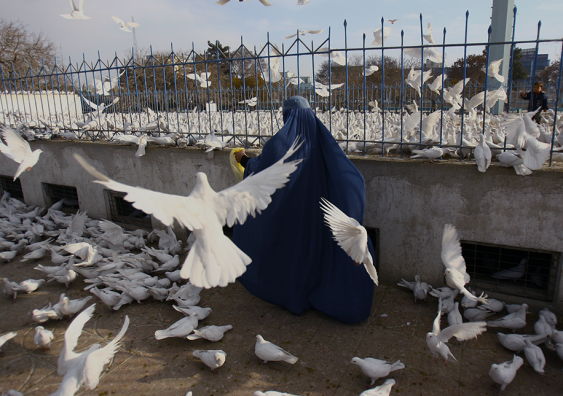
BBC journalist Omaid Khpalwak had just survived Taliban bomb blasts on the building next to the radio station where he was working. Moments later, he was shot dead by US Special Forces when they went in to clear the area, says UNSW’s Dr Susanne Schmeidl.
Dr Schmeidl, who was working as a peace and forced migration researcher in Afghanistan at the time, knew the Afghan journalist, BBC and Age newspaper stringer the year he was killed in 2011.
She had just commissioned the 25-year-old to write an article for the Lowy Institute’s Afghan Voices Series that she was editing.
“Omaid had his journalist pass around his neck,” says the honorary senior lecturer at UNSW Arts, Design & Architecture.
“He was hiding in the toilet, holding the pass up, showing it to the US soldiers.
“They thought he was holding something to pull another suicide bomb.
“And they shot him.”
Omaid spoke good English so the soldiers would have understood him, Dr Schmeidl says.
If his family hadn’t noticed the bullet casings were US, and not Taliban issue, and if Dr Schmeidl and others hadn’t pushed for a NATO investigation, the death of Omaid would have been dismissed as ‘collateral damage’, she says.
Dr Schmeidl worked for more than 10 years to December 2014 in Afghanistan, developing peacebuilding projects, advising international donor governments and the UN.
She also co-founded two local organisations there — the Afghan Civil Society Forum Organisation and The Liaison Office (TLO), employing mostly Afghans.
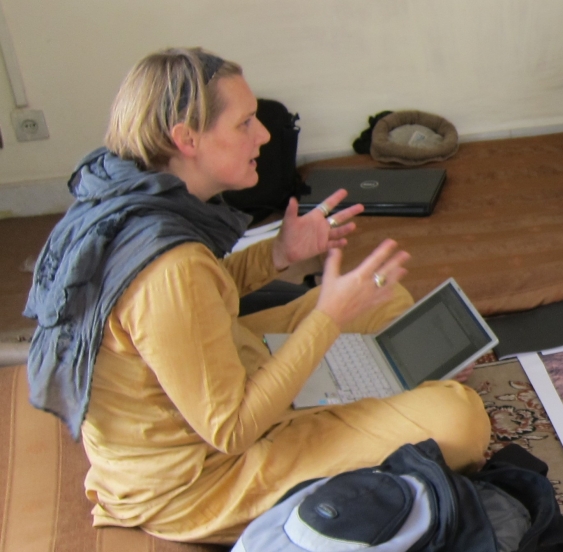
Dr Schmeidl at work in Jalalabad, Afghanistan in 2010. Photo: Stuart Robertson.
The peace and forced migration scholar interviewed warlords, the Taliban, security guards and US Special Forces while living among the locals to better understand the Afghan people and their culture.
Dr Schmeidl, who was working in the same province in the south where the Australian military base at Tarin Kowt was stationed, says she was not surprised when the Australian Defence Force released the findings from the Brereton Report.
She says although she did not interview Australian Defence Forces in Afghanistan, she heard about human rights violations by others, such as the US Security Forces in their kill/capture missions.

Dr Schmeidl blends in with the locals by wearing the local attire in Afghanistan in 2010. Photo: Stuart Robertson.
Her research on this topic led to two collaborative reports with the Open Society Foundation titled The Cost of Kill/Capture: Impact of the Night Raid Surge on Afghan Civilians and Strangers at the Door: Night Raids by International Forces Lose Hearts and Minds of Afghans.
“But for many Afghans, the nationalities of soldiers blur — with international soldiers often being lumped into the category of Americans,” Dr Schmeidl says.
Up to 19 Australian Special Forces soldiers are under investigation for the non-combatant killings of 39 prisoners and civilians from 2009 to 2014, Chief of the ADF Angus Campbell announced when the Brereton Report was released on November 19.
Dr Schmeidl says there needs to be strong and robust institutions willing to support whistleblowers and to “call out” vicious, criminal and wrong behaviours.
During her time in Afghanistan, Dr Schmeidl says she witnessed “hyper- masculine” behaviours among civilians and is in no doubt that it permeated through the ranks of foreign military.
“Among the civilians, I called it ‘the Indiana Jones effect’,” she says. “But I also felt that the US Special Forces went down that road to the point where it was a boys’ club trying to get one up on each other.
“We shouldn’t be surprised if it was something like the Lord of the Flies where, in that context, bad behaviours became normalised.
“So if they don't introduce some other balancing factors about civilian life in those contexts, then that will bring out toxic masculinity.”
Dr Schmeidl says we only need to look to the past to see how easily sadistic and violent behaviours can become normalised in conflict situations if they are not reined in.
The UNSW peace and forced migration scholar grew up in Germany.
“We know the Nazi Holocaust happened,” she says. “And we now know that war crimes happened when we thought there was a strong rules-based order.”
“That's why we now have rules of war and the Geneva Conventions to protect civilians in conflict and prisoners of war because we know that during war, humanity slips ... that is why there needs to be civilian oversight over the military.”
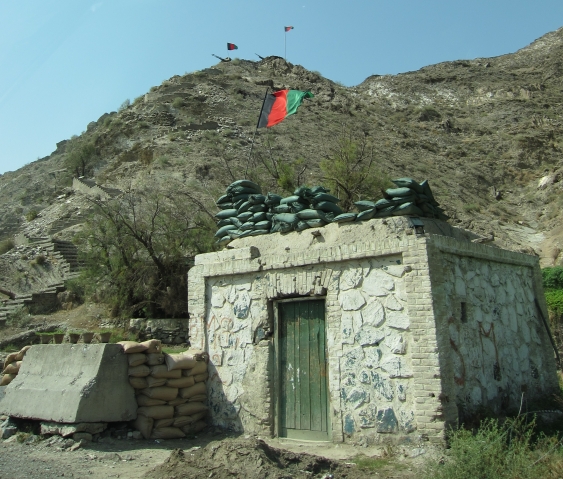
Dr Susanne Schmeidl often passed this checkpoint in Uruzgan where artillery firing live ammunition were stationed high on a hill, circa 2010. Photo: Stuart Robertson.
An issue that struck her, she says, is the practice of Bacha bāzī, which is ‘boy play’. This is where men with power, “particularly the police but also the army”, take young boys as sex slaves.
It’s paedophilia, she says.
“I heard of a soldier in the Canadian Forces who tried to call it out,” she says. “But others said: ‘oh, this is culture, we can’t touch it’. I think he was trying to blow the whistle but was later discharged.”
“So for me it is questions about: how much do soldiers call out poor behaviour among the Afghan National Army and also within their own ranks?
“How much do they normalise that behaviour? And how much does what they witness influence their own behaviour?
“It takes very strong personal ethics to stay the course.
“It's all hypothetical. But I can see how bad behaviour can develop in a context where there are limited checks and balances and where there's limited civilian engagement.”
Dr Schmeidl says she was also shocked to discover how often the US Special Forces would get the wrong person in their terrorist-targeting kill/capture programs.
“Some of their collaborators would just give them bad intelligence because it was a competitive environment and elites would often get to power by targeting their own enemies,” she says.
Her research on this topic is also presented in the collaborative reports with the Open Society Foundation titled The Cost of Kill/Capture: Impact of the Night Raid Surge on Afghan Civilians and Strangers at the Door: Night Raids by International Forces Lose Hearts and Minds of Afghans.
Dr Schmeidl says the military really needs to have a very nuanced understanding of the situation before they engage, “and that’s part of the first ‘do no harm’ approach”.
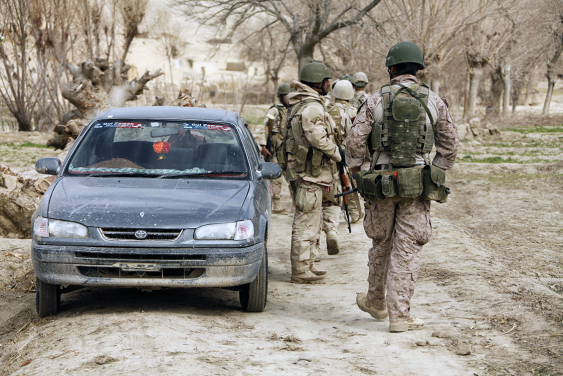
US Marines and the Afghan military patrol an area in Southern Afghanistan in 2012. Photo: GoodAndy45/Shutterstock.
Dr Schmeidl conducted research as a woman in a very male-dominated country.
Afghanistan is an Islamic nation mired in conflict and war.
The Taliban — an Islamic hardline group that ruled most of the country from 1996 to 2001 — imposed strict Sharia Law, taking away women’s rights to work and get an education.
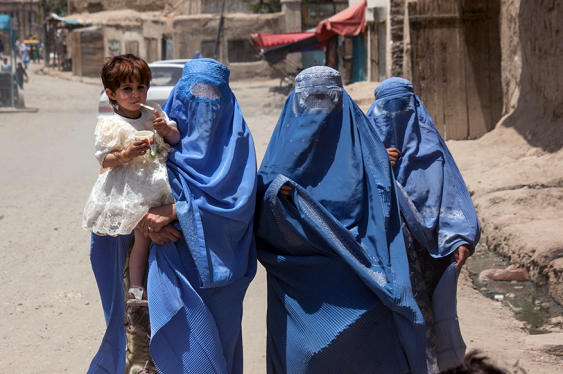
Three women walk with a child along a road in the Afghanistan of 2004 at the height of the war. As news of Afghanistan and its people made its way into international headlines, so too did images of the blue burqa. Photo: Shutterstock
Public lashings for not wearing a full-body burqa, and the amputation of hands and feet for petty crimes became common.
Dr Schmeidl says she visited Afghanistan briefly under Taliban rule in 2000, then returned to resume her fieldwork in 2002.
By that time, the Taliban had been toppled — to deny Al-Qaeda leader Osama Bin Laden and operatives a safe haven — by a US-led coalition acting in retaliation for the deaths of more than 3000 people in the terrorist attacks of September 11, 2001.
A new US-backed interim-president Hamid Karzai was installed in 2002. The rights of women had begun to improve marginally, but it was still a risk for many to even leave their homes in parts of the country.
In a chapter of the Fieldwork in the Social Sciences: danger, risk and reward book released this year, Dr Schmeidl wrote that she dressed conservatively in local clothing but was still groped by men in the course of her work.
She also became accustomed to the sound of bombs detonating nearby and even slept while bullets whizzed over the car she was in during a trip through a remote region.
But she took precautions and surrounded herself with people she could trust.
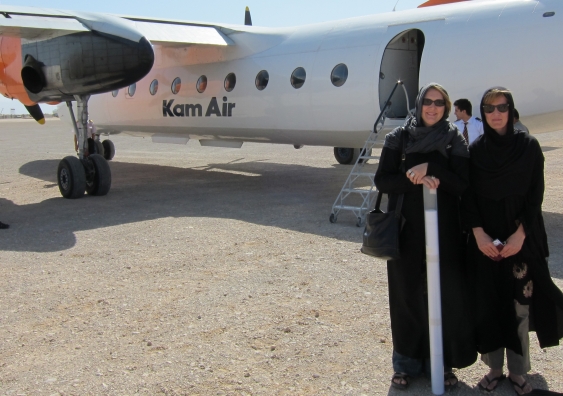
Dr Schmeidl and friend in local attire after landing on Afghanistan's Uruzgan airfield in 2010. Photo: Stuart Robertson.
Dr Schmeidl’s research in Afghanistan has contributed to a diverse range of projects that has helped international agencies and given directly back to local communities.
“We provided quarterly updates to international aid organisations about ‘red flags’, such as tribal rivalries, competition over scarce resources such as water, and areas of human rights violations in often very volatile situations,” she says.
Unfortunately, research that is passed on to incoming international organisations is regularly lost in the high rotation of staff and agencies arriving and leaving, she says.
“I think there's that bigger problem of information sharing,” she says.
Dr Schmeidl says the EU and other aid agencies need to establish and maintain a central database, so valuable information can be stored and collected as a handover for international aid agencies.
Her two organisations have also helped the disenfranchised youth, improved government communications and water management throughout Afghan communities.
Afghans are big on poetry and sport, Dr Schmeidl says. “You may not think of those as peace building activities, but it's a way of getting people together, to talk to each other or engage in cultural activities. So, we’d have poetry evenings or volleyball tournaments, for example.
“We also worked with Mullahs on positive messaging for education for girls,” she says.
And Dr Schmeidl and her team would show communities how to design and share scarce upstream and downstream water resources.
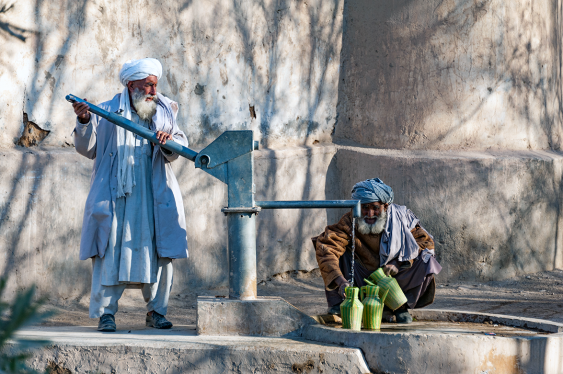
Afghan men in 2011 collecting water for their families at home in Helmand Province. Photo: Shutterstock.
Dr Schmeidl also did extensive research for several governments, including Australia until 2012, on various topics related to conflict-sensitivity, human security and peacebuilding.
One of the key conclusions she later published was that externally designed peace-building blueprints need locally adapted versions to fit every region, tribe and province.
“Otherwise, it can become something different or hijacked by local elites who make their own thing out of it, and then you [foreign forces] no longer control the outcome,” she says.
There are nuances between tribes, provinces and many other factors that have to be considered, she says.
When Australia cut funding to Dr Schmeidl’s organisation in 2012, research showed there was still a lot of work to be done in Uruzgan province.
Meanwhile, support for the Gillard government’s decision in 2012 to withdraw troops a year earlier than the planned date of 2014 had soared in Australia.
But the-then opposition attorney general George Brandis QC questioned Gillard’s motives for the withdrawal, saying it would be “shameful” if it was due to political convenience ahead of the 2013 federal election.
Dr Schmeidl’s research was later mentioned in a final report for the Australian government, and published online in a co-authored article titled The Afghan Local Police: unpacking a hybrid security arrangement.
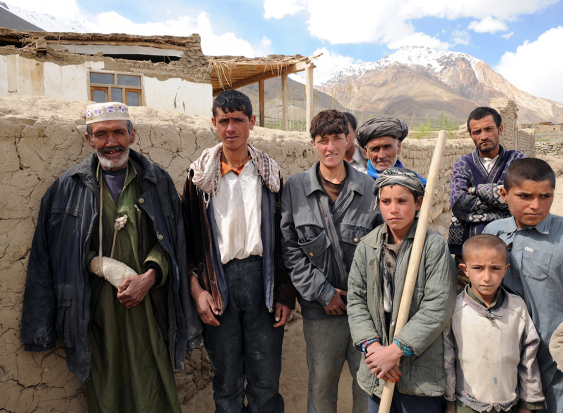
There are nuances between tribes and provinces that foreign forces need to take into consideration, says Dr Schmeidl. Photo: Shutterstock.
Dr Schmeidl says there is likely to be another mass exodus of people from Afghanistan if no peace agreement is reached and as the US readies to withdraw 2000 troops in January. Another 500 will be pulled out of Iraq.
“Studying the drivers of forced migration, the drivers of conflict and peacebuilding, is what brought me to Afghanistan in the first place,” she says. “It has the highest number of internal displacements it’s ever had in history … and a lot of people wouldn't want to stay under the rule of the Taliban.
“The Taliban already control large swathes of the region. If the US withdraws now there is a high likelihood they will come back to power.”
In attempts to end the violence, bombings and attacks, Afghanistan's current president, Ashraf Ghani, began peace negotiations with the Taliban in 2018.
Dr Schmeidl says a project by Afghan researchers, where she provided advisory and information about who spoke to elites involved in the peace talks, found they were more about getting, or staying, in power rather than peace-building.
And as peace talks continue, so does the bloodshed — an estimated 51 people were killed by the Taliban in the week to about October 25, Afghan Security Officials told the Washington Post.
Dr Schmeidl is also working on a book with an Afghan co-author about how Pashtun communities negotiate their life in insurgency-controlled or contested districts in Southern Afghanistan. She hopes it will be published in 2021 or 2022.
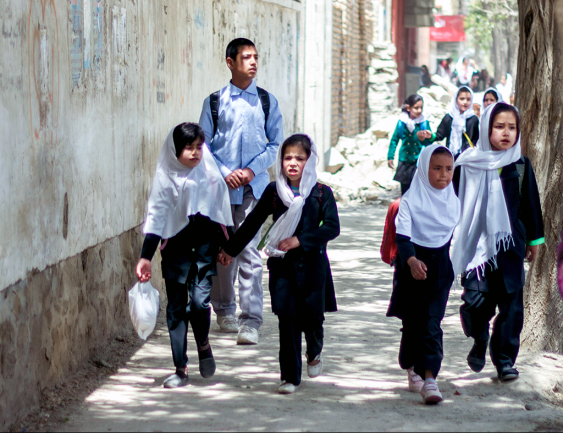
A group of children in Afghanistan on their way to school in 2019. Photo: Jose Matheus/Shutterstock. The current freedoms many people enjoy could revert if no peace agreement is reached and as more foreign troops withdraw from the region, says Dr Schmeidl.